Charles E. Campbell, the acting agent for the Cheyenne and Arapaho Agency, writes to Richard Henry Pratt praising him for his work educating the Fort Marion prisoners of war, and giving him an update on recruitment efforts for Carlisle.

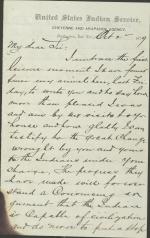
Charles E. Campbell, the acting agent for the Cheyenne and Arapaho Agency, writes to Richard Henry Pratt praising him for his work educating the Fort Marion prisoners of war, and giving him an update on recruitment efforts for Carlisle.
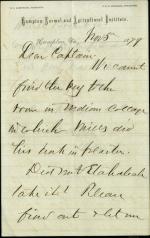
Samuel Chapman Armstrong of the Hampton Institute writes to Richard Henry Pratt inquiring whether Etadleuh still has the key to the Medium Cottage where Clark Mills took plaster casts of the heads of prisoners from Ft. Marion. Armstrong also discusses Hampton's capacity for Indian students.
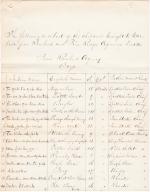
Captain Richard Henry Pratt writes to Ezra H. Hayt, Commissioner of Indian Affairs, regarding the first groups of Sioux, Menominee Ponca, Pawnee, Kiowa, Comanche, Wichita, Seminole, Cheyenne, and Arapaho children and young adults brought to the Carlisle Indian School. Pratt offers a detailed description of the journey, and then lists each…
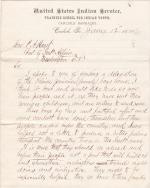
Richard Henry Pratt writes to Commissioner of Indian Affairs Ezra Hayt suggesting the return home of the former Ft. Marion prisoners, who had gone to Hampton and then Carlisle following their release. Pratt notes that they have been very helpful both at Carlisle and in general in generating good will among their people, and that sending them…
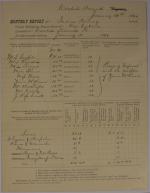
Two duplicate copies of the monthly school report for January 1880, submitted by the Carlisle Indian Training School to the Bureau of Indian Affairs. The report includes a list of employees, a count of students by Nation/Tribe, descriptions of the educational program, and Superintendent Richard Henry Pratt's remarks about developments and…
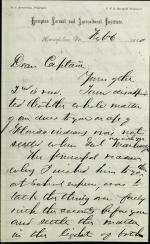
Samuel Chapman Armstrong of the Hampton Institute writes to Richard Henry Pratt about ongoing disagreements with Washington officials over expenses to be paid for the prisoners from Ft. Marion.
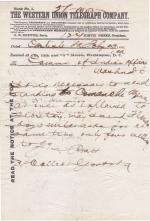
Richard Henry Pratt telegrams the Commissioner of Indian Affairs asking for permission to send Alfred John Standing to the Comanche Agency to recruit students. Pratt also asks if the former Florida prisoners can be sent back.
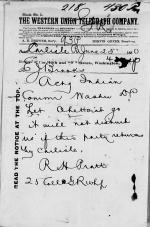
Richard Henry Pratt tells Acting Commissioner of Indian Affairs E. J. Brooks to let Charles Ohettoint go and that it won't disturb the Carlisle Indian School if the party returns.
Note: This item was copied from U.S. National Archives microfilm reels (M234), which were filmed from the original documents found in Record Group 75, Entry 79…
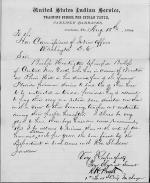
Richard Henry Pratt states that Bishop Huntington of New York is teaching four former Florida prisoners but would like to send two to the Carlisle Indian School. Pratt asks the Commissioner of Indian Affairs to grant Huntington's request.
Note: This item was copied from U.S. National Archives microfilm reels (M234), which were filmed…
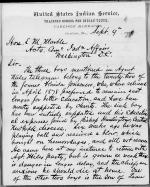
Richard Henry Pratt writes to Acting Commissioner of Indian Affairs E. M. Marble regarding three former Florida prisoners that should be returned home, escorted by Agent Miles. The first is going to die soon because of an accident suffered while playing baseball, and his chiefs want him to die at home. The second is the son of the late Cheyenne…
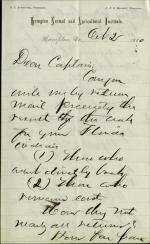
Samuel Chapman Armstrong of the Hampton Institute writes to Richard Henry Pratt asking for information about the former prisoners at Ft. Marion, and for more general information about Carlisle's students and operations.
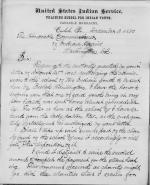
Richard Henry Pratt informs the Commissioner of Indian Affairs that he's received the two new students from Bishop Huntington. He sent the first one home almost immediately due to poor health, but the second one was fine, and he receives quarterly payments from a patron on the student's behalf. He asks if the quarterly payments should be placed…
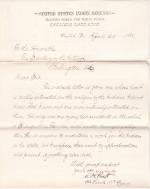
Richard Henry Pratt forwards a letter he received from Dr. H. Caruthers of Tarrytown, New York who is requesting the permission of the Secretary of the Interior to start a small school dedicated to educating Indian pupils. Pratt and Caruthers note that they met when Pratt was in St. Augustine, Florida and Dr. Caruthers wife was an assistant at…
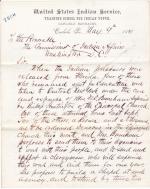
Richard Henry Pratt writes to seek authority to pay to send home three former prisoners who remained east for their education. The sponsor of Paul Zotom and David Oakerhater had them trained in agriculture as well as being ordained as deacons in the Episcopal Church while studying in Paris Hill, New York and is now proposing to build chapels at…
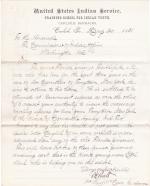
Richard Henry Pratt notifies the Commissioner of Indian Affairs that the former Kiowa prisoner Tsaitkopeta who has been living in Tarrytown, New York with Dr. H. Caruthers wishes to return home to the Kiowa and Comanche Agency. Pratt notes that he is entitled to have the government pay this expense and ends by saying that the only remaining…
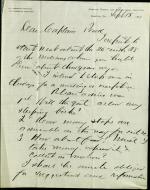
Samuel Chapman Armstrong of the Hampton Institute writes to Richard Henry Pratt asking for expense details for the return home of former Ft. Marion prisoners educated at Hampton over a three-year period. Armstrong also notes that the recovery of President James A. Garfield from an assassination attempt will be a benefit for them as they seek…
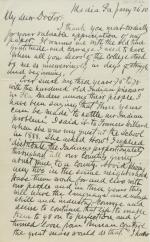
Richard Henry Pratt thanks Dr. Charles Francis Himes for his comments on his paper and his previous support from Dickinson College. Pratt comments on his work at the Carlisle Indian School and the formation of his policy at Fort Marion. Further, he details the outing program and its benefits for assimilation compared to the new policy of native…
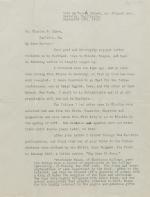
Richard Henry Pratt responds to a letter from former Dickinson Professor Charles Francis Himes. Pratt includes two excerpts from the Carlisle Indian School newspapers of 1880 describing Himes visits to the school performing science demonstrations. Pratt hopes he will be able to visit Carlisle on his trip East.